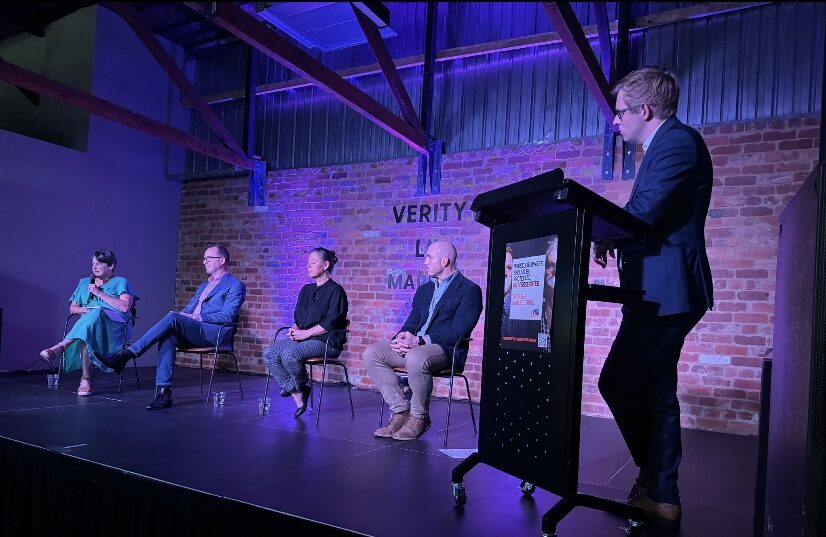Protections for journalists and whistleblowers needed now!

We are at a crucial time for transparency and media freedom in Australia.
On Thursday March 14th, I took part in a panel in Canberra called “Whistleblowers on trial; truth, transparency and accountability”.
It was originally timed to take place after the sentencing hearing of David McBride, a former Australian Defence Forces lawyer who’s been prosecuted for sharing documents in 2017 that exposed war crimes by Australian soldiers in Afghanistan.
The case was ultimately delayed, but the discussion was timely nonetheless.
Whistleblowers like McBride are crucial to the public’s right to know. But being a whistleblower is incredibly difficult and a lack of adequate protections for the individuals – and the journalists they work with – are contributing to a culture of coverup in Australia.
The panel discussion was kicked off with opening remarks from former SA Senator Rex Patrick, who has become a zealous advocate for the creation of a Whistleblower Protection Authority.
Kieran Pender from the Human Rights Law Centre led the discussion. I sat alongside Saffron Zomer from the Australian Democracy Network, Independent Senator for the ACT David Pocock, and NSW Greens Senator David Shoebridge.
It’s important to recognise why we need whistleblowers and why they need to be protected.
Most organisations seek a commitment from their workers to abide by rules and regulations, to commit to upholding the integrity of such organisations.
But when someone notices wrongdoing, and tries to report it, so often organisations go into defensive mode.
A whistleblower usually acts after internal processes have failed – they might have reported the wrongdoing, but they were ignored, or punished by those above them.
So, they feel compelled to go to the media. A journalist will look at the issues raised, assess the importance of it and either push to do the story or not. Often it means reading through classified or restricted documents or accessing otherwise secret material.
Under the present legislative regime, it’s a crime for a journalist to ‘deal’ with classified or forbidden information. Just receiving or even reading such material is a crime.
There has to be a better way.
There is no doubt that the infamous whistleblowers of recent times – McBride, Richard Boyle (who exposed wrongdoing at the ATO), Bernard Collaery (who with his client was responsible for revealing spy operations during 2004 oil and gas negotiations between Australia and East Timor) – have revealed material of great public interest.
Yet our spy agencies and prosecutors and senior government ministers seem to believe the revelations of whistleblowers – through journalists – are more damaging than the acts that are being exposed.
I would argue Australians are in fact safer for knowing that some soldiers, representing us around the world, carried out illegal acts in Afghanistan.
The people in Afghanistan who knew of these abhorrent actions exposed by McBride’s documents, should know that Australians are disgusted as well.
If those Afghanis thought Australians tolerated such violent acts, that we agreed with the actions of those men – surely that puts us in greater danger?
Locking up the messenger is not the answer.
The current secrecy provisions – 100s of them across federal laws – are doing the public a disservice.
A lack of protections for whistleblowers are doing the public a disservice.
Since the 2019 raid of the ABC by AFP seeking the McBride documents and other evidence to prosecute him, there’s been a chilling effect across the public sector.
Leaks about wrongdoing are rare these days, unlike the convenient political leaks that somehow are never pursued. That’s just as the government and the security agencies like it, I’m sure.
But does anybody genuinely believe there’s no malfeasance or misconduct in the services right now?? Of course not! It’s just that much harder to expose.
So it’s crucial that we provide better protections for whistleblowers and journalists.
I have been involved in discussions about improvements to the secrecy provisions of the Commonwealth Criminal Code, to end criminal sanctions against journalists and to ensure greater transparency and accountability for our intelligence and national security services.
As the Federal Media President of the Media Entertainment and Arts Alliance, I’ve contributed to MEAA’s submission to the Independent National Security Legislation Monitor’s review. The submission is on MEAA’s website.
We need your help, as concerned citizens and media consumers, to improve practices and processes.
To find out more about what YOU CAN DO, take a look at the Whistleblower Justice Fund site.
https://www.droptheprosecutions.org.au/
And check out MEAA’s submission on changes to secrecy provisions in the Commonwealth Criminal Code.
https://www.meaa.org/mediaroom/meaa-submission-to-the-review-of-national-security-legislation-march-2024/
